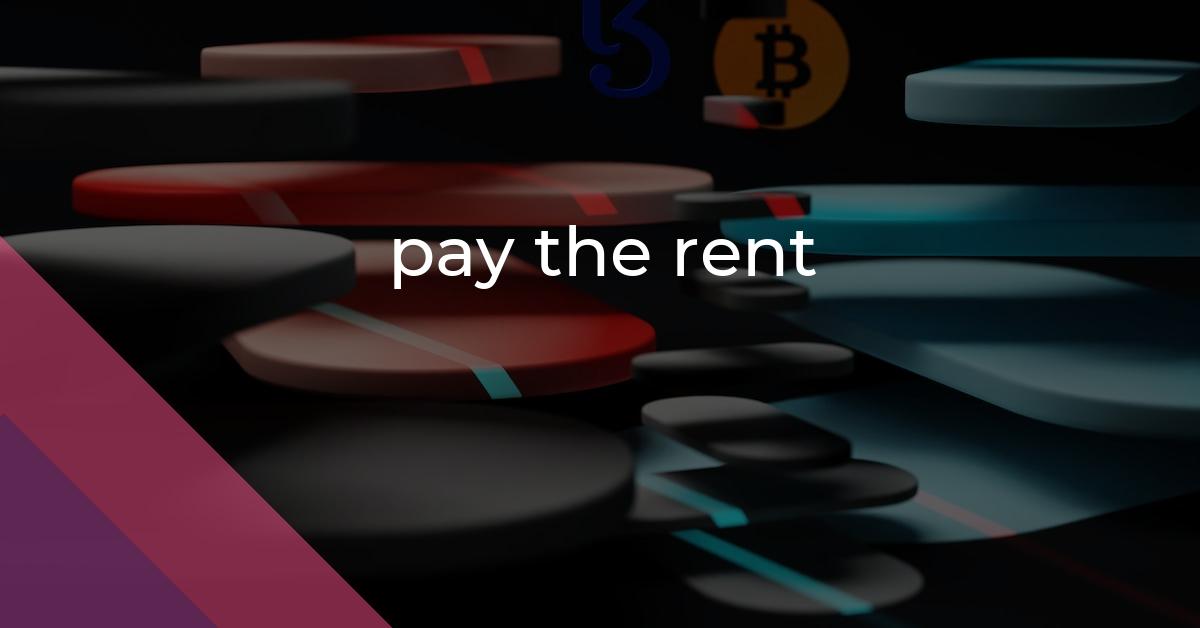pay the rent: Idiom Meaning and Origin
What does ‘pay the rent’ mean?
The idiom "pay the rent" means to meet one's financial obligations or responsibilities, especially in regard to sustaining one's livelihood or meeting basic needs. It implies fulfilling necessary obligations in order to maintain stability, similar to paying the bills or supporting oneself.

Idiom Explorer
The idiom "rent out" means to allow someone to use or occupy a property or space in exchange for payment. It is commonly used when describing the action of leasing or letting out a property for a specific period of time.
The idiom "put food on the table" means to provide the necessary income or means to support oneself and one's family.
The idiom "pony up" means to pay or give money, especially when it is expected or demanded. It is often used in a casual or slightly aggressive way to urge someone to contribute their share or fulfill their financial obligation.
The idiom "play one's part" means to do one's assigned or expected role in a particular situation or activity.
The idiom "pick up the tab" means to pay the bill or expenses for a group of people or oneself, often in a social or business setting.
The idiom "pay the piper" means to suffer the negative consequences or face the payment of a debt or obligation that has been incurred, typically as a result of one's own actions or choices.
The idiomatic phrase "pay the freight" means to bear the cost or responsibility for something. It is often used to convey the idea of taking on the financial burden or accountability for a particular situation or outcome.
The idiom "pay the bills" means to take care of one's financial responsibilities or obligations.
The idiom "pay one's dues" means to fulfill obligations or requirements, often through hard work or sacrifice, in order to achieve success or gain a certain position.
The idiom "pay one's debt to society" means to serve a punishment or make amends for a wrongdoing committed in order to satisfy the law and society's expectations of justice.
The Financial Obligation:
The idiom "pay the rent" is often used figuratively to refer to meeting one's obligations or responsibilities. It implies fulfilling a necessary task or duty that necessitates attention in order to avoid negative consequences.
Usage of the phrase extends to various contexts, both in informal conversations and formal writing. It can refer to completing a necessary task or fulfilling a commitment that is crucial for someone's well-being or success. For example, in a business context, it might be used to describe the importance of completing assignments or meeting deadlines to ensure the success of a project or maintaining a professional reputation. In personal relationships, it may be used to convey the idea of fulfilling emotional or practical duties to maintain a healthy relationship.
The underlying meaning of "pay the rent" lies in the idea of fulfilling one's obligations or responsibilities, often implying a moral or social duty. The idiom suggests that neglecting these obligations may have negative consequences, just as failing to pay rent could result in eviction or damage one's reputation. It emphasizes the importance of meeting one's commitments to maintain stability and avoid undesirable outcomes.
While the core meaning of "pay the rent" remains consistent, there are variations of the idiom that exist in different forms. For instance, it can be expressed as "paying one's dues," which conveys the idea of earning or deserving something through hard work or sacrifice. Other variations include phrases like "earning one's keep" or "pulling one's weight," which also emphasize the notion of fulfilling responsibilities or contributing their fair share.
Misinterpretation is possible with the idiom "pay the rent." In some cases, it might be misunderstood literally as paying actual rent or bills. However, the context in which it is used should provide clarity regarding its figurative nature and intended meaning.
The origin of the idiom "pay the rent" is unclear, as no specific source or historical information has been found to confirm its exact origin. However, its usage dates back to the early 19th century.
The idiom "pay the bills" is closely related to "pay the rent" as it also emphasizes the importance of meeting financial obligations. While "pay the rent" is generally used in a figurative sense, "pay the bills" is often used literally to refer to the act of paying one's expenses or bills.
The idiom "pay one's dues" is another related phrase. It aligns with the core meaning of "pay the rent" in the sense that it conveys the idea of earning or deserving something through hard work or sacrifice. Just as paying rent is a necessary responsibility to maintain a living space, paying one's dues implies fulfilling obligations or putting in the necessary effort to achieve a certain goal or gain recognition.
Additionally, the idiom "rent out" relates to "pay the rent" in terms of the rental agreement and the act of leasing a property to someone else. When someone decides to rent out their property, they expect the tenant to pay the rent regularly and meet their financial obligations. In this context, "pay the rent" is essential for both the landlord and the tenant in maintaining a mutually beneficial rental agreement.
The idiom "pay the rent" encompasses the broader theme of fulfilling responsibilities and meeting obligations. It serves as a reminder of the importance of addressing one's duties and obligations to maintain stability and avoid negative consequences. Whether it means completing necessary tasks, fulfilling commitments, or meeting financial obligations, "pay the rent" emphasizes the necessity of taking action and meeting responsibilities in various aspects of life.
Example usage
Examples of how the idiom "pay the rent" can be used in a sentence:
- After working multiple jobs, she was finally able to pay the rent on her new apartment.
- If you don't work hard and make sales, you won't be able to pay the rent for your business space.
- His part-time job barely pays the rent, so he is always looking for side gigs to make extra money.
More "Finances" idioms



